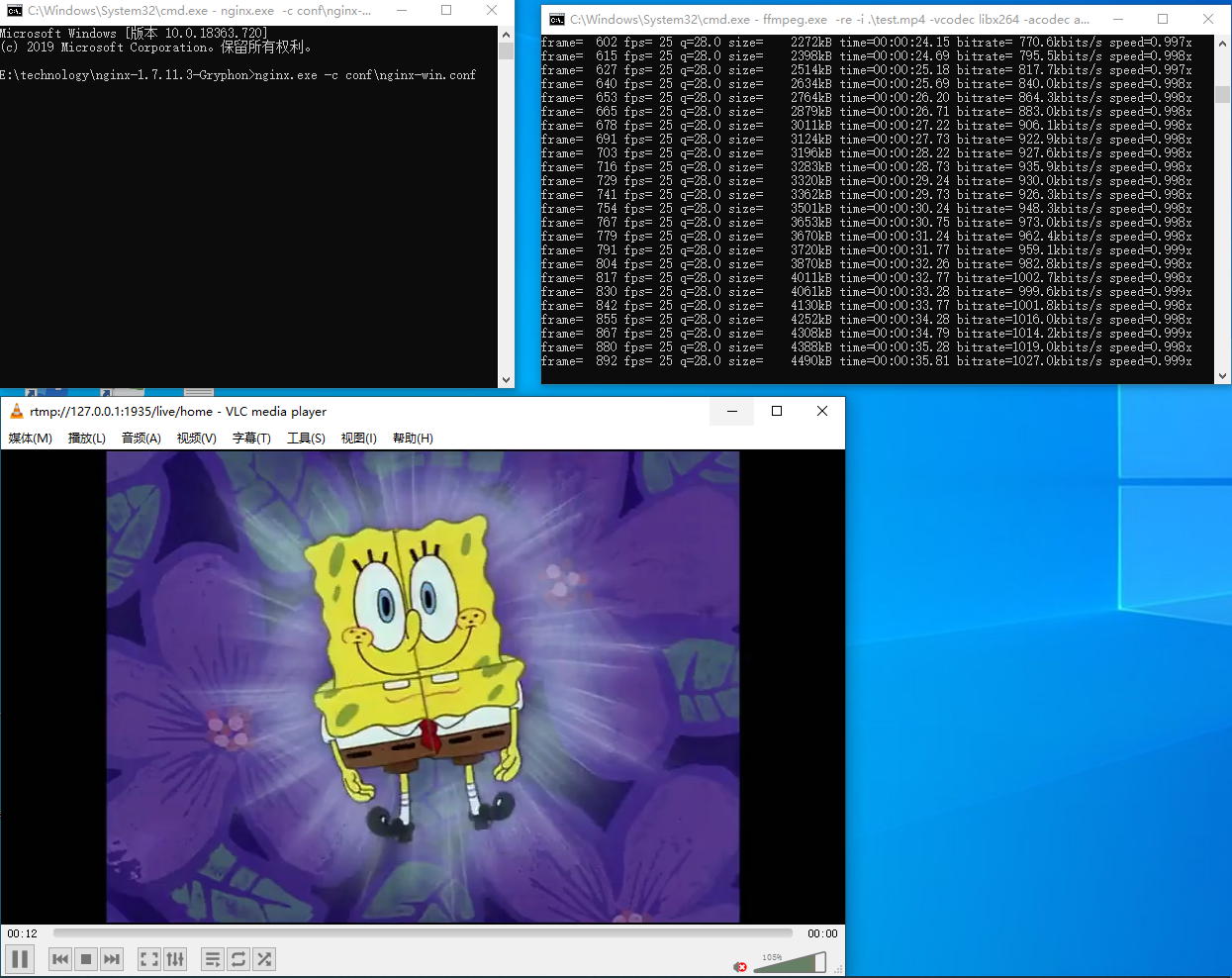Windows 搭建 nginx RTMP 服务器
前面采用 nginx + nginx-rtmp-module 的方式搭建 RTMP 服务器,由于在 windows 下未对 rtmp 模块进行编译,所以后面采用了 nginx Gryphon + nginx-rtmp-module 的方式,成功搭建了 RTMP 服务器。
1 环境与准备文件
开发环境:windows
开发工具:ffmpeg、nginx 1.7.11.3 Gryphon(nginx)、nginx-rmtp-module、vlc media player播放器
官方ffmpeg下载地址:http://www.ffmpeg.org
官方nginx下载地址:http://nginx.org/en/download.html
官方nginx 1.7.11.3 Gryphon下载地址:http://nginx-win.ecsds.eu/download/nginx
官方nginx-rtmp-module下载地址:https://github.com/arut/nginx-rtmp-module
官方vlc media player下载地址:https://www.videolan.org/vlc
2 安装nginx、ffmpeg与启动nginx
分别下载最新版本的 nginx 和 ffmpeg,都复制到 E:\technology 目录下,然后再将下载好的 nginx-rtmp-module 复制到 E:\technology\nginx-rtmp-module目录下。
然后配置环境变量:右键我的电脑 》属性 》高级系统设置 》高级 》环境变量 》双击 Path ,将 E:\technology\ffmpeg-4.2.1-win64-static\bin 和 E:\technology\nginx-1.17.9 都添加到 Path 路径下。
有很多种方法启动 nginx:
(1)直接双击 nginx.exe,双击后一个黑色的弹窗一闪而过。
(2)打开 cmd 命令窗口,切换到 nginx 解压目录下,输入命令 nginx.exe 或者 start nginx ,回车即可。
3 检查nginx是否启动成功
直接在浏览器地址栏输入网址 http://127.0.0.1:80 或者 http://localhost:80,回车,出现以下页面说明启动成功:

也可以在 cmd 命令窗口输入命令tasklist /fi "imagename eq nginx.exe,出现如下结果说明启动成功:

nginx 的配置文件是 conf 目录下的 nginx.conf,默认配置的 nginx 监听的端口为 80,如果 80 端口被占用可以修改为未被占用的端口即可,也因此 chrome 浏览器未显示端口。
检查 80 端口是否被占用的命令是:netstat -ano | findstr 0.0.0.0:80 或 netstat -ano | findstr "80",如果打印出了一下内容则说明 80 端口被占用:
TCP 0.0.0.0:80 0.0.0.0:0 LISTENING 6220
当我们修改了 nginx 的配置文件 nginx.conf 时,不需要关闭 nginx 后重新启动 nginx,只需要执行命令nginx -s reload即可让改动生效
4 配置nginx.conf文件
默认的 nginx.conf 文件并没有配置 RTMP 服务器,需要我们手动添加配置。具体步骤为:在 conf 目录中,复制粘贴 nginx.conf 文件并将其重名为 nginx-win.conf,修改其内容为:
#user nobody;
# multiple workers works !
worker_processes 2;
#error_log logs/error.log;
#error_log logs/error.log notice;
#error_log logs/error.log info;
#pid logs/nginx.pid;
events {
worker_connections 8192;
# max value 32768, nginx recycling connections+registry optimization =
# this.value * 20 = max concurrent connections currently tested with one worker
# C1000K should be possible depending there is enough ram/cpu power
# multi_accept on;
}
rtmp {
server {
listen 1935;
chunk_size 4000;
application live {
live on;
}
}
}
http {
#include /nginx/conf/naxsi_core.rules;
include mime.types;
default_type application/octet-stream;
#log_format main '$remote_addr:$remote_port - $remote_user [$time_local] "$request" '
# '$status $body_bytes_sent "$http_referer" '
# '"$http_user_agent" "$http_x_forwarded_for"';
#access_log logs/access.log main;
# # loadbalancing PHP
# upstream myLoadBalancer {
# server 127.0.0.1:9001 weight=1 fail_timeout=5;
# server 127.0.0.1:9002 weight=1 fail_timeout=5;
# server 127.0.0.1:9003 weight=1 fail_timeout=5;
# server 127.0.0.1:9004 weight=1 fail_timeout=5;
# server 127.0.0.1:9005 weight=1 fail_timeout=5;
# server 127.0.0.1:9006 weight=1 fail_timeout=5;
# server 127.0.0.1:9007 weight=1 fail_timeout=5;
# server 127.0.0.1:9008 weight=1 fail_timeout=5;
# server 127.0.0.1:9009 weight=1 fail_timeout=5;
# server 127.0.0.1:9010 weight=1 fail_timeout=5;
# least_conn;
# }
sendfile off;
#tcp_nopush on;
server_names_hash_bucket_size 128;
## Start: Timeouts ##
client_body_timeout 10;
client_header_timeout 10;
keepalive_timeout 30;
send_timeout 10;
keepalive_requests 10;
## End: Timeouts ##
#gzip on;
server {
listen 80;
server_name localhost;
location /stat {
rtmp_stat all;
rtmp_stat_stylesheet stat.xsl;
}
location /stat.xsl {
root nginx-rtmp-module/;
}
location /control {
rtmp_control all;
}
#charset koi8-r;
#access_log logs/host.access.log main;
## Caching Static Files, put before first location
#location ~* \.(jpg|jpeg|png|gif|ico|css|js)$ {
# expires 14d;
# add_header Vary Accept-Encoding;
#}
# For Naxsi remove the single # line for learn mode, or the ## lines for full WAF mode
location / {
#include /nginx/conf/mysite.rules; # see also http block naxsi include line
##SecRulesEnabled;
##DeniedUrl "/RequestDenied";
##CheckRule "$SQL >= 8" BLOCK;
##CheckRule "$RFI >= 8" BLOCK;
##CheckRule "$TRAVERSAL >= 4" BLOCK;
##CheckRule "$XSS >= 8" BLOCK;
root html;
index index.html index.htm;
}
# For Naxsi remove the ## lines for full WAF mode, redirect location block used by naxsi
##location /RequestDenied {
## return 412;
##}
## Lua examples !
# location /robots.txt {
# rewrite_by_lua '
# if ngx.var.http_host ~= "localhost" then
# return ngx.exec("/robots_disallow.txt");
# end
# ';
# }
#error_page 404 /404.html;
# redirect server error pages to the static page /50x.html
#
error_page 500 502 503 504 /50x.html;
location = /50x.html {
root html;
}
# proxy the PHP scripts to Apache listening on 127.0.0.1:80
#
#location ~ \.php$ {
# proxy_pass http://127.0.0.1;
#}
# pass the PHP scripts to FastCGI server listening on 127.0.0.1:9000
#
#location ~ \.php$ {
# root html;
# fastcgi_pass 127.0.0.1:9000; # single backend process
# fastcgi_pass myLoadBalancer; # or multiple, see example above
# fastcgi_index index.php;
# fastcgi_param SCRIPT_FILENAME $document_root$fastcgi_script_name;
# include fastcgi_params;
#}
# deny access to .htaccess files, if Apache's document root
# concurs with nginx's one
#
#location ~ /\.ht {
# deny all;
#}
}
# another virtual host using mix of IP-, name-, and port-based configuration
#
#server {
# listen 8000;
# listen somename:8080;
# server_name somename alias another.alias;
# location / {
# root html;
# index index.html index.htm;
# }
#}
# HTTPS server
#
#server {
# listen 443 ssl spdy;
# server_name localhost;
# ssl on;
# ssl_certificate cert.pem;
# ssl_certificate_key cert.key;
# ssl_session_timeout 5m;
# ssl_prefer_server_ciphers On;
# ssl_protocols TLSv1 TLSv1.1 TLSv1.2;
# ssl_ciphers ECDH+AESGCM:ECDH+AES256:ECDH+AES128:ECDH+3DES:RSA+AESGCM:RSA+AES:RSA+3DES:!aNULL:!eNULL:!MD5:!DSS:!EXP:!ADH:!LOW:!MEDIUM;
# location / {
# root html;
# index index.html index.htm;
# }
#}
}
这里监听端口未改动,仍然为 80,重点添加了 RTMP 服务器的相关配置,以搭建 RTMP 服务器,rtmp 协议的默认端口号是 1935。具体的配置详解请参考:菜鸟教程 - Nginx 配置详解
5 nginx方式启动服务器(失败)
按住 windows 键 +R,输入 cmd,进入 cmd 命令窗口,进入 nginx 目录:cd E:\technology\nginx-1.17.9,然后启动 nginx rtmp 服务器:
nginx.exe -c conf\nginx-win.conf
出现该错误:
nginx: [emerg] unknown directive "rtmp" in E:\technology\nginx-1.17.9/conf\nginx-win.conf:19
网上搜索该错误,找到解决该问题的博客:windows下nginx的rtmp配置加载问题 unknown directive "rtmp"
原因是:nginx 的 windows 版本可能在编译的时候没有对 rtmp 模块进行编译导致使用不了。
方法1:
下载源码重新进行编译并把 rtmp 模块进行编译进去,过程较为繁琐,这里不推荐,有兴趣的可以参考:第二讲:win7下nginx-rtmp-module的编译方法
方法2:
下载带 rtmp 模块的 nginx 版本,如 nginx 1.7.11.3 Gryphon,后续亲测可用。
6 nginx Gryphon方式搭建RTMP服务器(成功)
1. 下载 nginx 1.7.11.3 Gryphon
下载带 rtmp 模块的 nginx 版本,如 nginx 1.7.11.3 Gryphon,下载地址为:http://nginx-win.ecsds.eu/download/nginx
下载完成后解压,将解压后的目录名:nginx 1.7.11.3 Gryphon 改成:nginx-1.7.11.3-Gryphon。
2. 下载服务器状态检查程序
下载 nginx-rtmp-module,下载地址为:https://github.com/arut/nginx-rtmp-module/
将 nginx-rtmp-module-master.zip 解压后复制到目录 nginx-1.7.11.3-Gryphon 下,保证 stat.xls 的目录为:nginx-1.7.11.3-Gryphon\nginx-rtmp-module\stat.xsl。
3. 配置文件 conf\nginx-win.conf
与上面第 4 大步一致。
4. 启动服务器
按住 windows 键 +R,输入 cmd,进入 cmd 命令窗口,进入 nginx 目录:cd E:\technology\nginx-1.7.11.3-Gryphon,然后启动 nginx rtmp 服务器:
nginx.exe -c conf\nginx-win.conf
7 RTMP 推流测试
FFmpeg 本地视频推流测试:
ffmpeg.exe -re -i .\test.mp4 -vcodec libx264 -acodec aac -f flv rtmp://127.0.0.1:1935/live/home
使用 VLC 播放器测试,输入网络 URL:rtmp://127.0.0.1:1935/live/home
上面 IP 地址均可换成本地 IP。

摄像头推流测试:
ffmpeg -f dshow -i video="FHD Camera" -vcodec libx264 -preset:v ultrafast -tune:v zerolatency -f flv rtmp://127.0.0.1:1935/live/home
在设备管理器的"照相机"处,获得摄像头设备名称摄像头为"FHD Camera"。更多推流命令请参考:Windows 搭建 nginx rtmp服务器
8 扩展:关闭nginx
如果使用 cmd 命令窗口启动 nginx,关闭 cmd 窗口是不能结束 nginx 进程的,可使用两种方法关闭 nginx:
(1)输入 nginx 命令:nginx -s stop(快速停止 nginx) 或 nginx -s quit(完整有序的停止nginx)
(2)使用taskkill命令: taskkill /f /t /im nginx.exe
参考:




 浙公网安备 33010602011771号
浙公网安备 33010602011771号